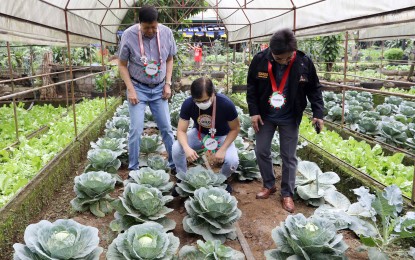
'HAPAG' SA BARANGAY. Interior Secretary Benjamin Abalos Jr. (center), DILG Undersecretary for Barangay Affairs Felicito Valmocina (left), and Overseas Workers Welfare Administration chief Arnaldo Ignacio inspect cabbages ready for harvest at the launch of the “Halina't Magtanim ng Prutas at Gulay” (HAPAG) project in Barangay Holy Spirit, Quezon City on Tuesday (Jan. 24, 2023). The project aims to help ensure food security in the country. (PNA photo by Joey O. Razon)
MANILA – The Department of the Interior and Local Government (DILG) has activated its urban gardening program in barangays to support President Ferdinand R. Marcos Jr.'s initiative to ensure food sufficiency initiatives.
The project, dubbed the “Halina’t Magtanim ng Prutas at Gulay (HAPAG) sa Barangay”, was launched in Barangay Holy Spirit, Quezon City on Jan. 24, DILG Secretary Benjamin Abalos Jr. said in a statement Wednesday night.
Abalos said the initiative is worth following as the country's 42,000 barangays are ideal for conventional urban farming.
Other viable options, such as aquaponics, can also contribute to food production in villages, he said.
"Aquaponics is a combination of aquaculture (fish farming) and hydroponics (growing plants in a nutrient solution). The aquaponics systems involve the growing of plants and the raising of fish with the help of beneficial bacteria. Hydroponics is the art of gardening without soil and in its absence, water goes to work providing nutrients, hydration, and oxygen to plant life," he added.
Asked if urban farms would be mandatory in all barangays, Abalos said the DILG would observe the implementation of the project in the next months to determine its impact and benefits.
The project, he said, would serve as a strategy to diversify food sources and contribute to ensuring food security in the country while it aims to strengthen the capacity of barangays for sustainable agriculture initiatives through community gardening in their areas.
Under the program, households and communities will be urged to produce fruits and vegetables from their backyards and spaces, as well as vacant areas in the barangays. (PNA)
